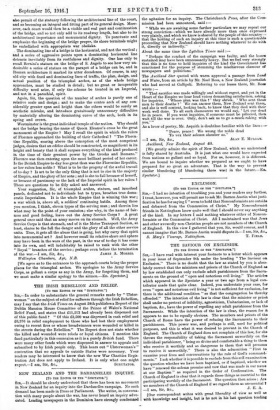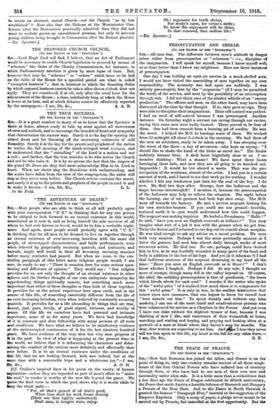THE SAVIOUR ON EXCLUSION.
To THE EDITOR OP THE " SPECTATOR:1
have read with interest your footnote to a letter which appears in your issue of September 9th under the heading " The Saviour on Exclusion." There is no doubt that the law as stated by you is abso- lutely correct that the ministers and priests of the Church of England as by law established can only exclude adult parishioners from the Sacra- ments on the ground of " open and notorious evil living." Tho articles which appeared in the Spectator a year or two ago from a legal con- tributor made that quite clear. Indeed, you understate your case, for even " open and notorious evil living " is not sufficient for exclusion, for there is the additional condition " so that the congregation be thereby offended." The intention of the law is clear that the minister or priest shall under no pretext of infidelity, agnosticism, Unitarianism, or lack of baptism, ho., have the power of repelling any adult parishioner from the Sacraments. While the intention of the law is clear, the reason for it appears to me to be equally obvious. The members and priests of the Church of Rome have the power of refusing the Sacraments to their parishioners. This power was, and perhaps is still, used for political purposes, and this is what it was desired to prevent in the Church of England. The Church of England does not complain of this law, for she throws the responsibility of taking the Sacrament unworthily on the individual parishioner, " being so divine and comfortable a thing to them who receive it worthily and so dangerous to them that will presume to receive it unworthily." There is also the admonition " First to examine your lives and conversations by the rule of God's command.' ments." I ask whether it is possible to exclude from this self-examination the question whether we have been baptized, or if baptized, whether we have " renewed the solemn promise and vow that was made in our name at our Baptism " as required in the Order of Confirmation. The Church of England is clear that it regards those things as essential to the participating worthily of the Sacrament. The question then arises : Are wo members of the Church of England if we regard them as unessential —I am, Sir, ha., J. E. A. [Our correspondent writes with great liberality of view as well as with knowledge and insight. but is he not in his last question tending to create an abstract, unreal Church—not the Church " as by law established" ? Note also that the Bishops. at the Westminster Con- ference after the Restoration practically admitted that they did not want to exclude grown-up unconfirmed persons, but only to prevent young children being brought to Communion after the Roman practice. —ED. Spectator.]































 Previous page
Previous page